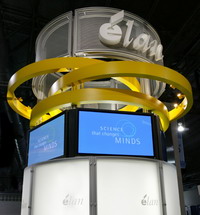Elan Corp marks its low third-quarter losses
Third-quarter losses of biopharmaceutical company Elan Corp. PLC are low.

For the July-September quarter, Elan reported a net loss of US$87.4 million (61.3 million EUR), 25.3 percent less than its US$117 million loss in the same quarter of 2006.
Sales rose 43.2 percent to US$176.6 million (123.8 million EUR), chiefly because of the growth of Tysabri use among MS sufferers in the United States and European Union.
Tysabri - produced in conjunction with U.S. drug maker Biogen Idec Inc. - accounted for 37 percent of Elan's total product revenues, compared to virtually nothing in the same period last year when the drug was just entering the market.
European and U.S. regulators approved Tysabri for sale in mid-2006 under heavily restricted conditions because of its link to developing progressive multifocal leukoencephalopathy, a rare, usually fatal disease attacking the brain and central nervous system.
Elan and Biogen had withdrawn Tysabri from U.S. sale in February 2005 after two users contracted PML. A third case was quickly confirmed, and two victims died. The companies have reported no new cases since.
Chief Financial Officer Shane Cooke said the number of MS sufferers taking Tysabri has reached 17,000 - above the 15,000 threshold required for its sales to be profitable - and was growing rapidly.
In the United States, the company said about 2,000 doctors were prescribing Tysabri to 10,500 MS sufferers at the end of September, a 22 percent gain in just six weeks. It said 5,500 MS sufferers were using Tysabri in Europe, up 28 percent over the same period, while another 1,000 people were taking it in clinical trials.
Cooke said Elan's goal, in conjunction with Biogen Idec, was for Tysabri to reach 100,000 customers by 2010.
Elan and Biogen Idec scientists jointly developed Tysabri. Biogen Idec of Cambridge, Massachusetts, manufactures the drug. Elan is responsible for U.S. distribution, Biogen for other markets.
Analysts agree that Elan's future depends on continued success for Tysabri and a breakthrough in its efforts to identify a treatment for Alzheimer's disease.
Elan said it expected to find out in mid-January whether the U.S. Food and Drug Administration will approve Tysabri for use by sufferers of Crohn's disease, an intestinal disorder.
Elan reported continued progress in its ongoing clinical trials of three potential Alzheimer's treatments. Two drugs are being developed in conjunction with Wyeth, the third with Transition Therapeutics Inc.
U.S. and EU regulators permit Tysabri use only for patients who are failing to respond to longer-established MS drugs. The incurable disease attacks the central nervous system, subjecting victims to sudden paralysis of the legs, arms or face.
Clinical trials have demonstrated that Tysabri - which is administered every four weeks by intravenous infusion in specially approved clinics - is best at blocking relapses.
Elan said its long-term debts have fallen to US$1.77 billion (1.24 billion EUR) at the end of September, a 25.8 percent drop in just nine months. The debts are due for repayment by 2013.
Elan shares closed up 0.53 EUR(US$0.76), or 3.3 percent, at 16.53 EUR(US$23.58) on the Irish Stock Exchange. In 2005, the shares plummeted from 25 EUR to below 3 EUR following the surprise withdrawal of Tysabri.
Subscribe to Pravda.Ru Telegram channel, Facebook, RSS!


